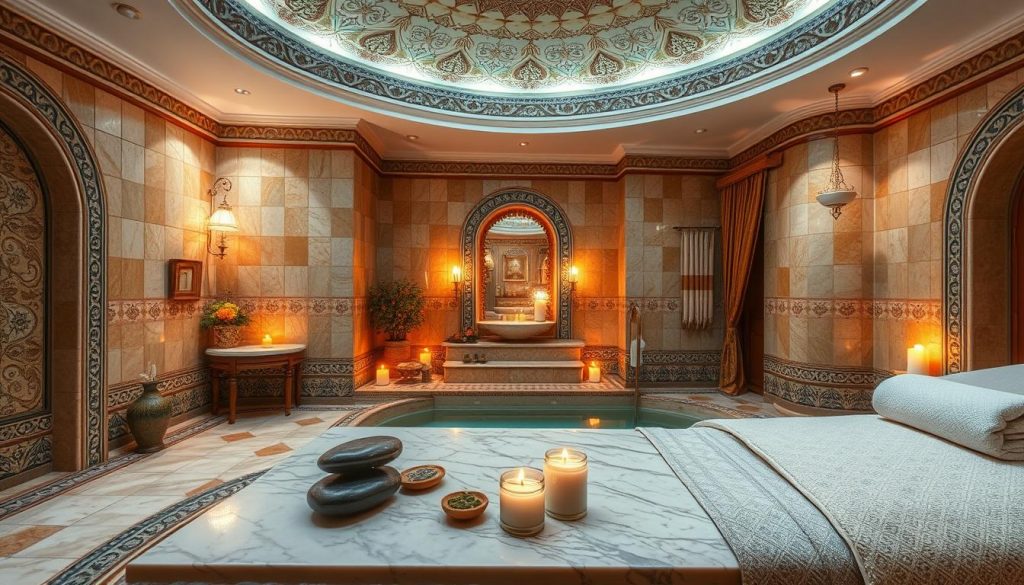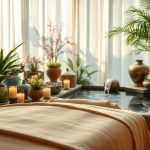Turkish baths hide ancient secrets of relaxation and rejuvenation. This guide unveils the world of traditional Turkish massage. We’ll explore its rich history, cultural importance, and authentic healing techniques.
Traditional Turkish massage has been vital to Turkish culture since the 14th century. It preserves Ottoman Empire wisdom and highlights Turkish baths’ significance. You can still experience this healing practice in hammams across Turkey.
Turkish massage, also called turkish bath or ottoman massage, offers authentic healing power. These ancient techniques have been passed down for generations. They continue to provide deep relaxation and rejuvenation.
Key Takeaways
- Traditional Turkish massage has a rich history dating back to the Ottoman Empire
- Turkish baths, or hammams, are an essential part of Turkish culture and city life
- Authentic Turkish massage techniques promote deep relaxation and rejuvenation
- Proper etiquette and steps are crucial for a genuine Turkish bath experience
- You can find traditional Turkish baths and spas throughout Turkey, with varying price ranges and services
Introduction to Traditional Turkish Massage
Experience the wonders of traditional Turkish massage, a centuries-old practice. This ancient ritual combines relaxation, cleansing, and healing. Step into the warm, humid hammam and discover tranquility and rejuvenation.
The Turkish bath, or hammam, is a widely exported custom. The Seljuk and Ottoman Turks perfected it after adopting it from Romans and Byzantines. Today, modern hamams offer this luxurious ritual, with some even carved out of caves.
During a Turkish massage, you’ll spend about 15 minutes in the sauna. The humidity reaches 100% with temperatures between 40°C to 48°C. This prepares your body for deeper cleansing and relaxation.
The bathing room is a large tiled space with an octagon-like bench. Here, women of all shapes enjoy the ancient therapy. Traditional Turkish music plays as your masseur guides you through various techniques.
- Kese: An invigorating scrub with a special cloth to remove dead skin cells
- Foam massage: A gentle massage with a soft, soapy foam to cleanse and moisturize your skin
- Oil massage: A soothing massage with olive oil, which is easily absorbed due to your open pores from the previous scrubbing
Traditional Turkish massage offers numerous benefits. It improves circulation, relieves stress, and enhances skin health. This practice cleanses your body and rejuvenates your mind and soul.
The Turkish bath is not just a place to cleanse the body, but also to purify the soul and find inner peace.
The Turkish massage experience is unforgettable for both newcomers and enthusiasts. Surrender to your masseur’s skilled hands and explore relaxation and self-discovery. You’ll leave feeling refreshed and revitalized.
History and Cultural Significance of Turkish Baths
Turkish baths, or hammams, have a rich history dating back to the Ottoman Empire. These public baths have been crucial to Turkish culture for centuries. They serve as social hubs and important cleansing rituals.
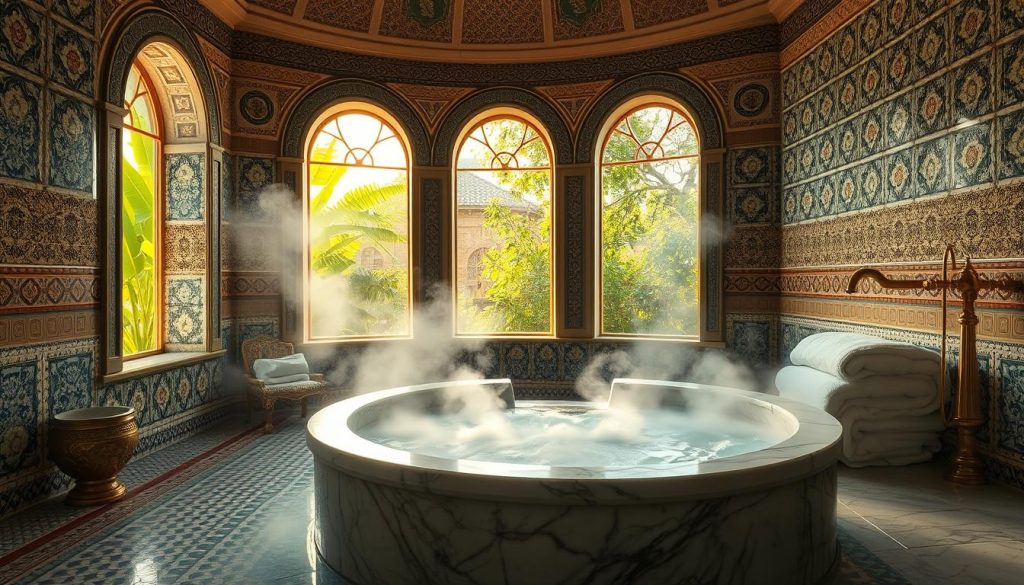
Ottoman Empire Origins
Communal baths trace back to the Roman Empire. However, Turkish baths flourished during the Ottoman Empire in the 15th century. Ottoman society valued cleanliness, leading to thousands of hammams being built.
These turkish baths became essential to daily life for people of all backgrounds. They reached their peak during this period, shaping Ottoman culture significantly.
Evolution of Turkish Baths
A traditional hammam has three main areas: hot, warm, and cool rooms. These rooms offer heat, steam, and scrubbing believed to have healing benefits.
Turkish baths evolved to include unique cultural elements like the bridal hammam. Modern hammams now blend traditional practices with contemporary spa treatments, attracting diverse visitors.
Importance in City Life
Turkish baths were once central to city life. They served as social hubs where people from different classes could mingle. Women spent hours in hammams, bonding and preparing meals together.
Hammams fostered a sense of community and belonging. They were democratic spaces that broke down social barriers.
Turkish massage parlors and turkish massage spas still attract tourists seeking cultural experiences. The ottoman massage techniques and traditional bath rituals fascinate visitors looking to relax and explore Turkey’s heritage.
Preparing for Your Turkish Bath Experience
Preparing for your Turkish bath massage can be exciting and a bit nerve-wracking. Understanding what to expect and proper etiquette is key. Traditional hammams offer a unique blend of history, culture, and relaxation.
What to Expect as a First-Timer
A Turkish hammam greets you with warmth and humidity. The typical sequence includes changing into a pestemal, a traditional Turkish towel.
You’ll relax in the steam room to open your pores. Then, a tellak (masseur) will give you a vigorous scrub using a kese (exfoliating mitt).
Next, enjoy a foam wash and massage. Cool down with cold water afterward. Finally, rest and sip on Turkish tea.
- Changing into a pestemal, a traditional Turkish towel
- Relaxing in the steam room to open your pores
- Receiving a vigorous scrub from a tellak (masseur) using a kese (exfoliating mitt)
- Enjoying a foam wash and massage
- Cooling down with cold water
- Resting and sipping on Turkish tea
Prices for Turkish massage therapy services vary. Options range from self-service to luxurious packages:
| Service | Price (Turkish Lira) |
|---|---|
| Self Service Bath | 175 |
| Body Scrub & Soap Massage | 300 |
| Extra Oil Massage | 150 |
| Extra Honey Massage | 150 |
| Clay Mask | 100 |
Gender Segregation in Turkish Baths
Traditional Turkish massage parlors maintain gender segregation. Separate areas exist for men and women. Ladies attend to female guests, while men handle male visitors.
Some modern hammams for tourists may offer mixed-gender steam rooms. It’s crucial to respect the dress code. This typically means keeping towels on or wearing swimsuits.
Keep an open mind and embrace the traditional Turkish hammam experience. Don’t hesitate to share concerns or preferences with the attendants. After your bath, relax and enjoy the amenities.
Savor a cup of Turkish tea before leaving. Remember to tip the staff for their service.
“The Turkish hammam experience is a journey of purification and rejuvenation, connecting you with centuries of tradition and leaving you with a profound sense of well-being.”
Step 1: Undressing and Dressing Etiquette
Proper etiquette is vital for a pleasant turkish bath experience. Most hammams serve both genders separately. You’ll receive a peştamal, a traditional Turkish towel, to wrap around yourself.
Many wear undergarments or swimsuits beneath the peştamal. Some choose to be nude. The peştamal ensures modesty throughout your visit. Attendants and therapists are always the same sex as bathers.
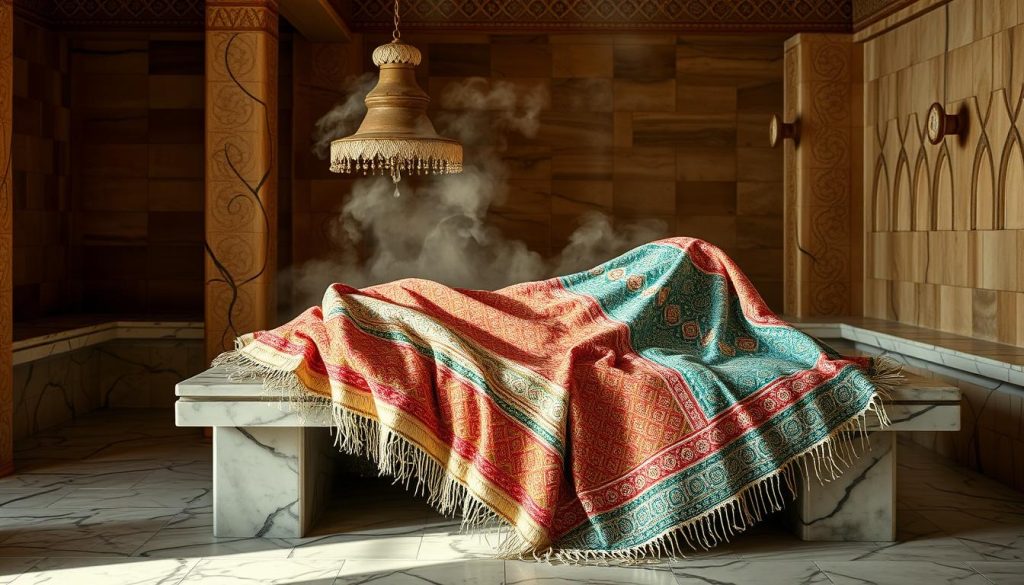
Be considerate when undressing. Hammams often provide lockers or private changing areas. Bring waterproof slippers to keep feet clean and prevent slipping on wet surfaces.
| Essential Items | Description |
|---|---|
| Peştamal | Traditional Turkish towel made of natural fibers, used to wrap around the body |
| Undergarments or Swimsuit | Worn beneath the peştamal for modesty |
| Waterproof Slippers | Keeps feet clean and prevents slipping on wet surfaces |
| Toiletries | Bring your own shampoo, soap, and other personal care items if desired |
An attendant will guide you to the main area to start your hammam ritual. The experience usually lasts about an hour. Popular Istanbul hammams might rush visitors due to busy schedules.
Take your time to enjoy this unique cultural experience. Remember to respect the traditions and etiquette of the Turkish bath.
Step 2: Relaxation and Sweating
The steam room’s warmth envelops you, starting your relaxation journey. Temperatures range from 104-122°F (40-50°C), with 90-100% humidity. This environment promotes deep relaxation and sweating, key to the Turkish bath experience.
The pre-heating room helps you adapt to the heat. Spend 10-15 minutes here before entering the main steam room. Most guests use this time to unwind and let the heat work its magic.
Temperature and Humidity in Turkish Hammams
Turkish hammams maintain specific temperature and humidity levels. This creates the perfect environment for sweating and relaxation. The heat opens your pores, preparing your skin for cleansing and exfoliation.
As you inhale the warm, moist air, your muscles loosen. Your mind drifts into a peaceful state, enhancing the overall experience.
Benefits of Sweating
Sweating offers many benefits for your body and mind. It helps eliminate toxins, leaving your skin refreshed. The heat and humidity improve blood circulation, reducing muscle tension.
Sweating softens your skin, making it more receptive to scrubbing and massage. This enhances the turkish massage benefits, preparing you for upcoming treatments.
Use this time to let go of stress and focus on the present. The relaxation phase is crucial for turkish massage therapy. It sets the stage for the invigorating treatments ahead.
Step 3: The Authentic Turkish Bath Scrub
The authentic Turkish bath scrub is a key part of the traditional experience. A skilled masseur, called a tellak, performs this invigorating treatment. They help you achieve soft, smooth skin and improve circulation.
The tellak expertly exfoliates and cleanses your skin. They guide you through the process, ensuring your comfort and well-being. Their expertise is crucial for a thorough and relaxing treatment.
The Role of the Masseur (Tellak)
Tellaks are highly trained professionals specializing in Turkish bath scrubs and massages. They understand traditional techniques deeply. Their goal is to give you the best possible experience in the Turkish bath.
Using the Kese (Turkish Bath Cloth)
The kese is a key tool in Turkish bath scrubs. It’s a traditional exfoliating cloth made of silk or cotton. The tellak gently scrubs your skin with the kese, removing dead cells.
This process reveals fresh, glowing skin underneath. It can improve circulation and leave your skin feeling incredibly soft. The scrubbing happens in a cooler room, preparing your skin for exfoliation.
| Turkish Bath Step | Duration | Benefits |
|---|---|---|
| Sauna Experience | 5-10 minutes | Relaxation, opens pores |
| Aromatic Oil Massage | 20 minutes | Relaxation, moisturizes skin |
| Turkish Bath Scrub | 10-15 minutes | Exfoliation, improves circulation |
After the scrub, your skin will feel incredibly soft and smooth. The process removes dead skin cells, allowing new ones to emerge. New cells may take two to three weeks before they start to flake.
A Turkish bath massage offers many benefits for your wellness routine. It improves circulation and provides deep relaxation. This authentic experience helps you achieve healthier, more radiant skin while enjoying a cherished tradition.
Step 4: Cleansing Yourself
After the invigorating scrub, it’s time to cleanse your body in the Turkish bath. This step is crucial for deep cleansing and purification. You’ll feel refreshed and rejuvenated as you rinse off dead skin cells and impurities.
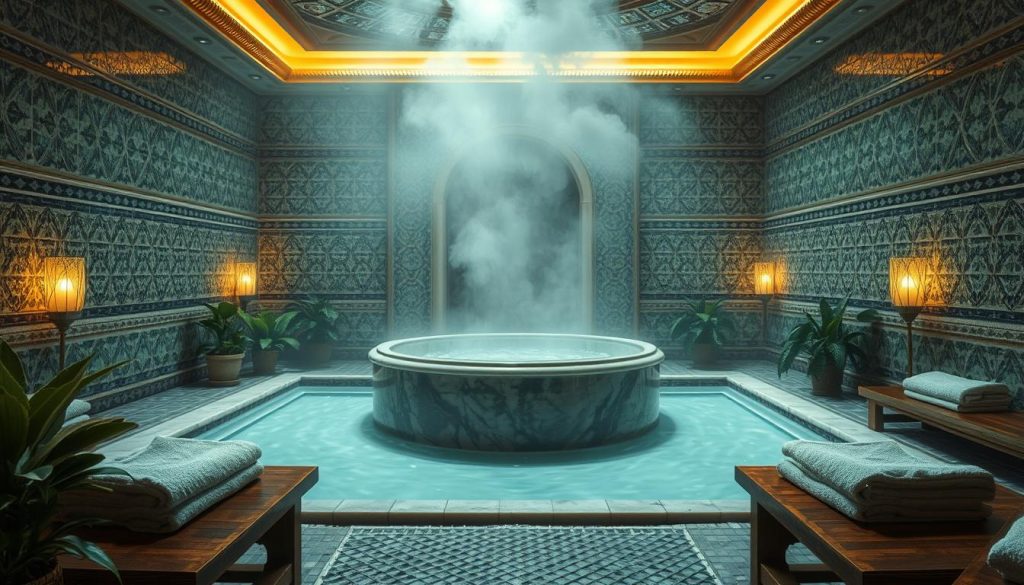
The Importance of Cleansing in Turkish Baths
Cleansing is key to the Turkish massage therapy experience. Washing with soap and water removes dirt and sweat. It also allows your skin to breathe and absorb massage benefits.
Warm water helps open up your pores, improving circulation. It aids in eliminating toxins from your body. Take a moment to appreciate the communal aspect of the Turkish bath.
Istanbul alone has 237 hammams, with 60 still in daily operation. These spaces offer unique relaxation and social interaction. Embrace this centuries-old tradition refined by the Ottoman Empire.
| City | Number of Hammams |
|---|---|
| Istanbul | 237 |
| Cappadocia | Various options |
| Pamukkale | Various options |
Bring essentials like a towel, flip-flops, and a change of clothes. Men typically wear swim trunks or shorts. Women often choose a two-piece swimsuit or bikini.
Some hammams provide disposable underwear for extra coverage and comfort. As you cleanse, feel the turkish massage benefits wash over you. Your skin will be left soft, smooth, and radiant.
Step 5: Indulging in a Relaxing Massage
It’s time for a soothing Turkish massage therapy after the invigorating scrub. Skilled masseurs at Çatma Mescit Hammam use traditional techniques to help you unwind. You’ll fully embrace the therapeutic benefits of Turkish massage.
Masseurs use effleurage and kneading to target tense muscles. These Turkish massage techniques improve circulation and reduce stress. You’ll feel rejuvenated after the massage.
Çatma Mescit Hammam offers various hammam rituals and packages. They range from 30 minutes to 1.5 hours, suiting every preference. You can choose from 10 different massage treatments.
The exclusive 60-minute Çatma Signature Massage is also available. You can customize your experience to maximize the benefits of Turkish massage therapy.
| Experience Duration | Price (Euro) |
|---|---|
| 50 Minutes | 40 |
| 70 Minutes | 55 |
| 85 Minutes | 75 |
| 100 Minutes | 105 |
Çatma Mescit Hammam has separate sections for men and women. Female therapists exclusively serve female guests. The hammam provides all essentials, including towels, soap, and shampoo.
The Turkish massage left me feeling completely rejuvenated and relaxed. The therapist’s skilled hands worked out all the knots and tension in my muscles, leaving me with a sense of pure bliss.
During the Turkish massage therapy, you’ll experience numerous benefits firsthand. These include improved flexibility and reduced muscle tension. You’ll also feel a profound sense of well-being.
This final step completes your journey of relaxation and renewal. It’s the perfect way to end your hammam experience.
Traditional Turkish Massage Techniques and Benefits
Turkish hammam massage uses various techniques for relaxation and well-being. These include foam massage, oil massage, hot stone massage, cupping therapy, and reflexology. Each method offers unique benefits for body and mind.
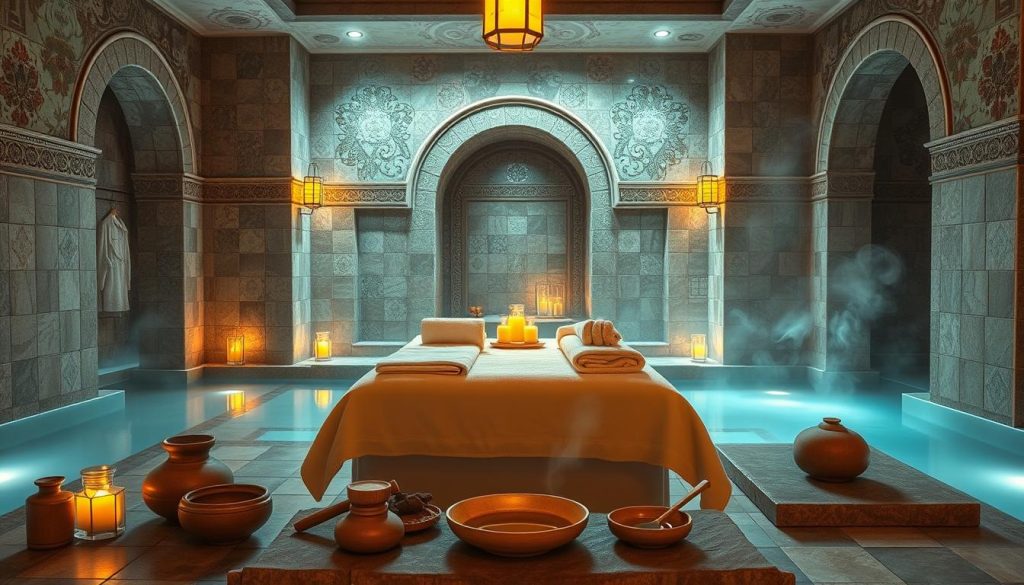
The Kese, a traditional mitt, is key to the Turkish hammam experience. It boosts circulation and aids lymphatic drainage. Black soap draws out impurities, detoxifying the skin.
Essential oils like lavender and rosemary are used for their unique properties. Other oils include eucalyptus, orange, and peppermint.
Types of Turkish Massage Techniques
The Turkish hammam massage incorporates several techniques, including:
- Foam massage
- Oil massage
- Hot stone massage
- Cupping therapy
- Reflexology
Cupping therapy increases blood flow and reduces inflammation. Hot stone massage eases muscle tension and promotes relaxation. Reflexology stimulates healing and brings balance to the body.
Health Benefits of Traditional Turkish Massage
Turkish hammams offer many health benefits through heat, steam, and massage. These include improved circulation, detoxification, and exfoliation.
| Benefit | Description |
|---|---|
| Improved circulation | Stimulates blood flow throughout the body |
| Detoxification | Encourages sweating and promotes lymphatic drainage |
| Exfoliation | Removes dead skin cells for healthier, glowing skin |
| Relaxation | Promotes deep relaxation and reduces stress |
| Muscle tension relief | Alleviates muscle tension and pain |
| Cellulite reduction | Helps reduce the appearance of cellulite |
After a Turkish massage, cool down slowly by rinsing with cool water. Drink herbal tea and rest to enhance the benefits. A healthy lifestyle and diet can boost the massage’s detoxifying effects.
Turkish Bath Etiquette and Tips for First-Timers
A Turkish bath, or hammam, offers a unique cultural experience. Understanding the etiquette can help you enjoy it fully. Let’s explore the customs and practices of these traditional baths.

Turkish baths have separate areas for men and women. They may also have different times for each gender. Massages are usually done by someone of the same gender.
Privacy and modesty are crucial in a hammam. Respect others’ space and keep yourself covered appropriately.
Do’s and Don’ts in a Turkish Bath
Here are some key guidelines for your Turkish bath visit:
- Bring dry underwear to change into after the bath
- Bring personal toiletries if sensitive to standard soap used in the hammam
- Keep noise levels to a minimum to maintain a serene environment
- Tip your masseur around 20% of the total cost
- Visit the Turkish bath at the beginning of your trip if concerned about preserving a newly acquired suntan
Communicating with Bath Attendants
Bath attendants, or tellaks, are used to working with tourists. They can guide you through the process, even with language barriers.
Here are some tips for effective communication:
- Learn basic Turkish phrases such as “please,” “thank you,” and “yes/no”
- Use hand gestures to indicate your preferences
- Ask for clarification if unsure about a specific step or service
| Service | Price Range (Euros) |
|---|---|
| Basic Turkish Bath | 25-35 |
| Scrub by Attendant | 10-15 (additional) |
Following these tips will help you enjoy your Turkish bath experience. Relax and immerse yourself in this centuries-old tradition. Embrace the soothing atmosphere of a Turkish massage parlor or spa.
Choosing the Right Turkish Bath or Spa
Finding the perfect Turkish bath in Istanbul is key to a great experience. Options range from ancient hammams to modern Turkish massage spas. Consider these factors to choose the best Turkish massage parlor for you.
Authentic vs. Tourist-Oriented Turkish Baths
Authentic Turkish baths like Cemberlitas Hamam offer a true hammam experience. They feature stunning Ottoman architecture and a local atmosphere. Tourist-oriented Turkish massage spas provide modern amenities for international visitors.
However, these newer spas may lack the charm of traditional baths. Your choice depends on your preference for authenticity or modern comforts.
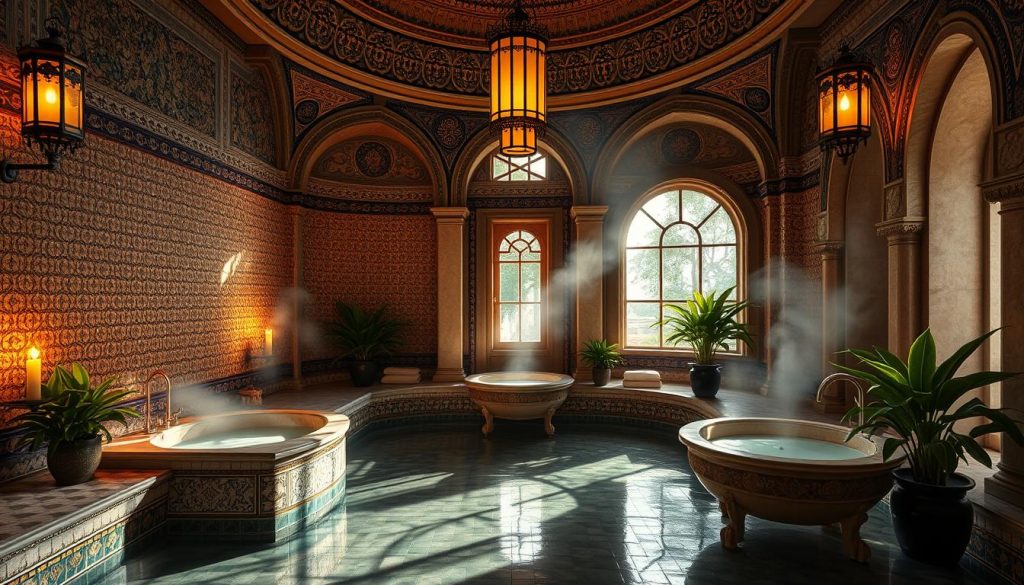
Price Ranges and What to Expect
A Turkish bath in Istanbul typically costs between $40 and $70 US dollars. This equals about 750 to 1,300 Turkish lira. The price includes a 45-minute package with washing, scrubbing, and massage.
It’s customary to tip the attendant around 60 Turkish lira after the massage. Most baths are gender-segregated, except for Sultan Suleyman Hamam.
Men usually wear a peshtemal (Turkish bath towel) around their waist. Women can bring swimsuits or use provided towels and paper garments.
“A Turkish bath experience usually lasts at least two hours and can be a communal and leisurely activity.”
A traditional hammam visit typically lasts at least two hours. You’ll enjoy relaxation, sweating, scrubbing, and massage stages. This communal experience is deeply rooted in Turkish culture.
Combining Turkish Baths with Other Wellness Experiences
Boost your turkish bath experience by pairing it with other wellness activities. Many Bodrum spas offer packages that include hammam sessions and facials or yoga classes. Bodrum spa centers provide the perfect setting for a complete wellness journey.
Couples can enjoy private hammams like Çatma Mescit for tailored sessions. These often include body scrubs, foam massages, and essential oils. Such sessions offer an intimate experience compared to communal hammams.
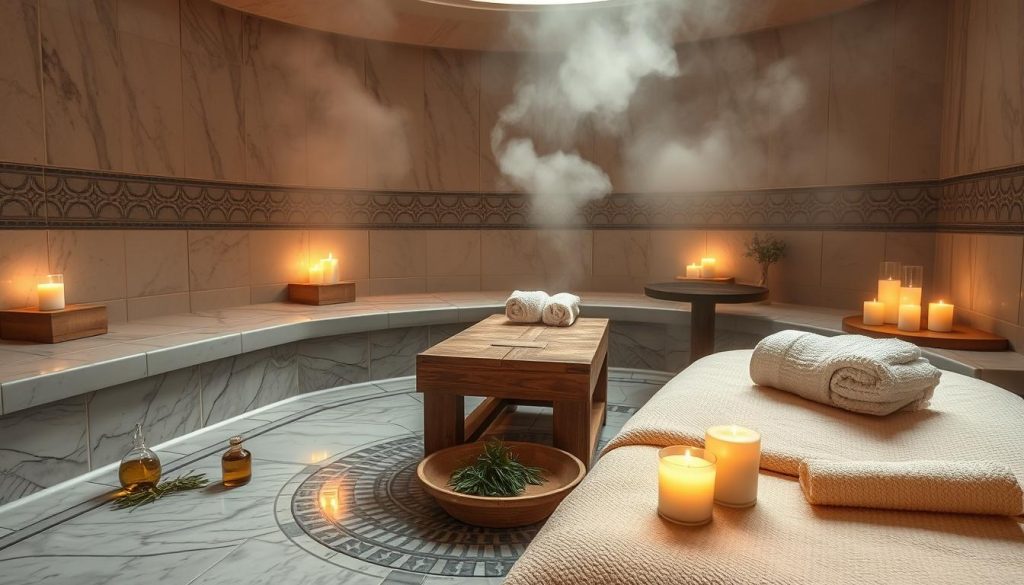
Hürrem Sultan Hammam blends traditional rituals with modern wellness approaches. Their hot chamber therapy uses heat stones and bowls for muscle relaxation. The massage with a bath glove ensures deep cleaning and skin rejuvenation.
The cold chamber experience helps the body rest and firms the skin. It also contributes to an overall sense of wellness.
“Hammams are public steam rooms that often provide massage and exfoliation, utilizing steam to open skin pores, remove dead skin, increase circulation, eliminate toxins, and aid in issues such as cellulite.” – Karima Lasfar, owner of O’Kari hammam in Paris
Consider these tips when planning your Turkish bath experience:
- Allow 1-2 hours for a complete hammam session, including body scrubs and foam massages.
- Be prepared mentally and emotionally for the nudity aspect of the experience.
- Ensure your skin is recently cleansed and avoid wearing makeup.
- If you have respiratory or blood pressure conditions, are pregnant, sensitive to heat, or prone to dehydration, consult with the spa staff before booking a hammam session.
Combining your turkish bath with other wellness experiences enhances its benefits. You’ll maximize turkish massage benefits and leave feeling refreshed and rejuvenated.
Experiencing Traditional Turkish Massage at Home
You can enjoy relaxing benefits of a Turkish massage at home. Use essential oils and simple techniques to create a spa-like atmosphere. Unwind in your own space with these easy methods.
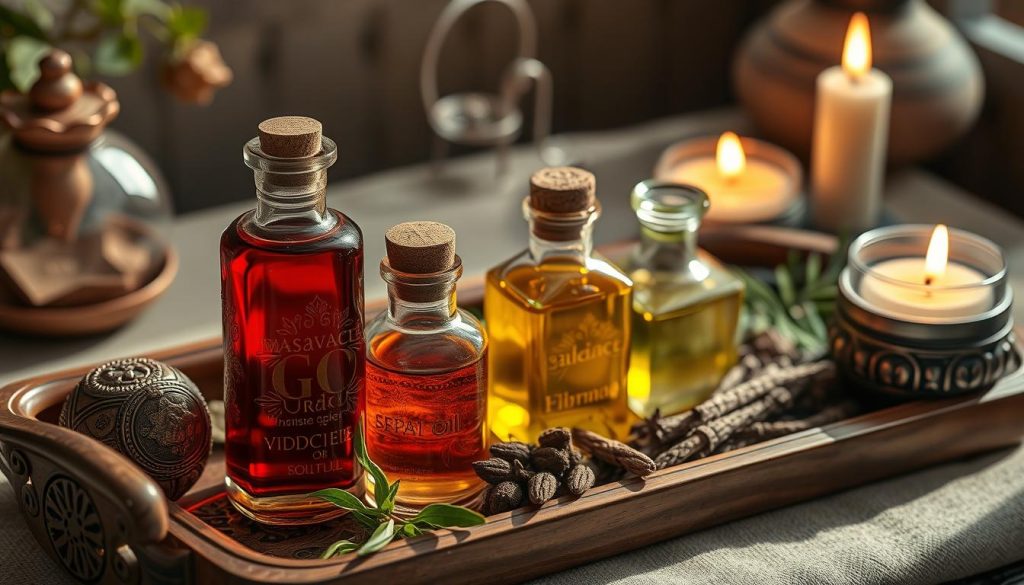
Essential Oils for Turkish Massage
Turkish massage often uses natural oils to nourish skin and promote relaxation. Common essential oils include lavender, peppermint, rose, and eucalyptus.
- Lavender: Known for its calming properties, lavender oil helps reduce stress and anxiety.
- Peppermint: This invigorating oil can help soothe sore muscles and improve circulation.
- Rose: With its gentle floral scent, rose oil is great for hydrating the skin and promoting a sense of well-being.
- Eucalyptus: This oil has a cooling effect on the skin and can help relieve muscle tension.
Always dilute essential oils with a carrier oil before use. This prevents skin irritation. Try coconut or jojoba oil as carriers.
Simple Turkish Massage Techniques
Try these easy methods at home for a relaxing Turkish massage experience:
- Warm-up: Begin by gently rubbing your hands together to create heat, then apply warm oil to your skin.
- Kneading: Using your palms and fingertips, knead your muscles in a circular motion, focusing on areas of tension.
- Stretching: Gently stretch your muscles by holding each position for 10-15 seconds, then release.
- Pressure points: Apply firm pressure to specific points on your body, such as your temples or the soles of your feet, to promote relaxation.
Listen to your body during the massage. Adjust pressure and techniques to your comfort level. This ensures a safe and enjoyable experience.
“A traditional Turkish massage at home can be a wonderful way to unwind and practice self-care, even if you can’t visit a hammam.”
| Massage Oil | Benefits | Recommended Dilution |
|---|---|---|
| Lavender | Reduces stress and anxiety | 2-3 drops per 1 tsp carrier oil |
| Peppermint | Soothes sore muscles, improves circulation | 1-2 drops per 1 tsp carrier oil |
| Rose | Hydrates skin, promotes well-being | 1-2 drops per 1 tsp carrier oil |
| Eucalyptus | Cools skin, relieves muscle tension | 1-2 drops per 1 tsp carrier oil |
Add these oils and techniques to your self-care routine. Experience the benefits of a Turkish massage at home. Enjoy relaxation and rejuvenation in your own space.
Conclusion
Traditional Turkish massage is a unique and rejuvenating wellness approach. It’s an essential part of the Turkish bath experience. This ancient practice offers benefits like improved circulation, detoxification, and deep relaxation.
You can visit a luxurious hammam in Istanbul or try Turkish massage at home. Embrace the rituals and techniques passed down through generations. When choosing a Turkish bath, consider authenticity, price, and additional services.
Respect the etiquette and customs of hammams. This includes gender segregation and proper attire. These practices help you fully immerse in the traditional experience.
Turkish massage and hammams offer relaxation, cleansing, and cultural exploration. Understanding their history and techniques helps you make informed decisions. Try this ancient ritual and discover its transformative power for yourself.
FAQ
What is traditional Turkish massage?
What are the benefits of Turkish massage?
What should I expect during a Turkish bath experience?
Are Turkish baths gender-segregated?
What should I wear to a Turkish bath?
How do I choose the right Turkish bath or spa?
Can I experience Turkish massage at home?
What are the different types of Turkish massage techniques?
What is the role of the masseur in a Turkish bath?
How can I communicate with bath attendants if there is a language barrier?
Source Links
- The Beginner’s Guide to Your First Turkish Hammam – https://thebeautraveler.com/turkish-hammam-guide/
- The First-Timer's Guide to Turkish Baths – https://www.camhotel.com.tr/en/blog/what-happens-in-a-turkish-bath/
- First-time guide to Istanbul’s bath houses – https://www.lonelyplanet.com/articles/guide-to-istanbuls-bath-houses
- What to Expect in a Traditional Turkish Bath – https://www.tourradar.com/days-to-come/traditional-turkish-bathhouse/
- Turkish bath (Hammam): what is it, how to take it, benefits and contraindications – Effe Perfect Wellness – https://www.effe.it/en/blog/bagno-turco-hammam-che-cose-come-si-fa-benefici-e-controindicazioni/
- Turkish bath – http://www.goreme.com/turkish-bath
- The History of the Turkish Bath | The Art of Wayfaring – https://artofwayfaring.com/understanding-turkey/the-history-of-the-turkish-bath/
- What is a Traditional Turkish Hammam? | Hurrem Sultan Hammam – https://www.hurremsultanhamami.com/en/what-is-a-traditional-turkish-hammam/
- The Tradition of Hammams in Turkish Culture: A Ritual of Cleansing and Community – Turkish Baths 1877 – https://turkishbaths1877.com/the-tradition-of-hammams-in-turkish-culture-a-ritual-of-cleansing-and-community/
- What To Expect From An Istanbul Hammam Experience – Two For The World – https://www.twofortheworld.com/istanbul-hammam-experience/
- Turkish Hammam Experience: Tips For First Timers – https://www.hurremsultanhamami.com/en/turkish-hammam-experience-tips-for-first-timers/
- My First Time Traditional Turkish Hammam Experience – Everywhere She Travels – https://everywhereshetravels.com/my-first-time-turkish-hammam-experience/
- Turkish Bath Guide for First Time Visitors – How to Get Hammam Treatment – TURKEY TRAVEL JOURNAL – https://www.turkeytraveljournal.com/turkish-bath/
- Turkish hamam etiquette: What to know before you go – https://www.dailysabah.com/turkey/expat-corner/turkish-hamam-etiquette-what-to-know-before-you-go
- Turkish Bath Experience: A Step-by-Step Ritual Hürrem Sultan Hammam – https://www.hurremsultanhamami.com/en/turkish-bath-experience-a-step-by-step-ritual-hurrem-sultan-hammam/
- Turkish Hammam Rituals and Features – https://www.hurremsultanhamami.com/en/turkish-hammam-rituals-and-features/
- Antalya Turkish Bath: Traditional Hammam Experience – https://bookfromlocals.com/turkey/antalya/antalya-turkish-bath/
- Visiting an Authentic Turkish Bath (Hamam) in Antalya | Planet Janet Travels – https://www.planetjanettravels.com/visiting-authentic-turkish-bath-hamam-in-antalya/
- Turkish Hammam Guide to this Relaxing Tradition – https://turkey-e-visas.com/news/turkish-hammam-guide-to-this-relaxing-tradition/
- HAMMAM RITUAL: A Fantastic 4-Staged Cleansing of Body & Spirit – Amberhammam – Unikalne SPA w Gdańsku – https://amberhammam.com/en/oferta/hammam-ritual/
- Istanbul: Turkish Bath, Spa and Massage Experience in Sisli – Istanbul Hamam – https://istanbulhamam.com/st_tour/istanbul-turkish-bath-spa-and-massage-experience-in-sisli/
- Hammam Services You Can Benefit From – https://www.catmamescithamami.com/hammam-services/
- The Best Therapeutic Massage Techniques | Old Hammam & Spa – https://oldhammam.co.uk/massage-techniques-in-turkish-hammam/
- The Unique Turkish Bath Treatment – Art of Sauna and Spa – https://artofsauna.ca/the-unique-turkish-bath-treatment/
- What to expect in the Turkish Bath ( hamam ) I Walks In Istanbul – https://walksinistanbul.com/what-to-expect-in-the-turkish-bath-hamam/
- The First-Timer’s Guide to Avoiding Embarrassment at a Turkish Bath – https://www.bootsnall.com/articles/the-first-timers-guide-to-avoiding-embarrassment-at-a-turkish-bath.html
- Turkish Baths Istanbul – How to Choose the Right Hammam – https://cassiescompass.com/turkish-baths-istanbul-how-to-choose-a-hammam/
- The Basics of a Turkish Bath – https://www.cntraveler.com/stories/2013-02-27/hammam-turkish-bath-explained
- Couples Hammam in Istanbul: A Relaxing Getaway at Çatma Mescit Hammam – Catma Mescit Hammam – https://www.catmamescithamami.com/couples-hammam-in-istanbul-a-catma-mescit-hammam-getaway/
- I Visited a Hammam Spa For a Surprising Lesson in Female Empowerment – https://www.byrdie.com/hammam-spa
- Turkish Hammam: Wellness at Hürrem Sultan Hammam – https://www.hurremsultanhamami.com/en/turkish-hammam-for-good-health-and-fitness-a-wellness-experience-in-hurrem-sultan-hammam/
- Experiencing a Turkish Massage in Turkey – https://www.hilarytopper.com/experiencing-a-turkish-massage-in-turkey/
- Hammam Spa – This is what happens in a Turkish Bath House – https://www.likeachieff.com/hammam-spa-what-happens-in-turkish-bath-house/
- Turkish Hammam: An Ultimate Guide to the Authentic Turkish Bath Experience – Tourism Turkey: Top Travel Spots and Tourist Attractions – https://visitturkey.in/turkish-hammam-an-ultimate-guide-to-the-authentic-turkish-bath-experience/
- Hammam: What Is a Turkish Bath & What to Know About It – https://www.catmamescithamami.com/hammam/
